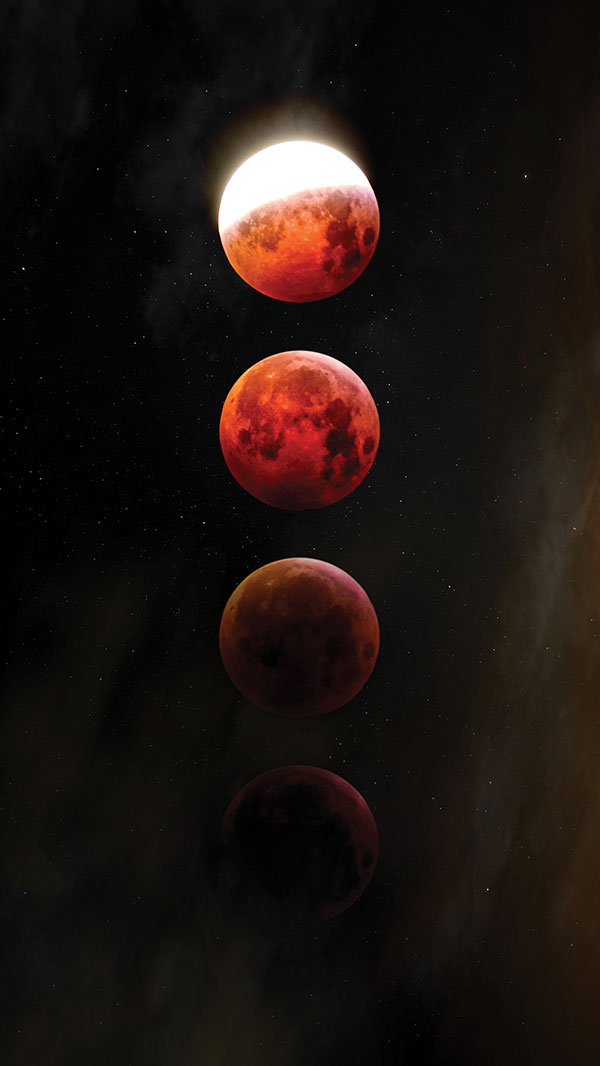The Unsevered Tongue

A mother’s conflict with her daughter causes her to reflect on Khawnaa, a mathematician-astrologer and light of the Bengali medieval court.
When my daughter raised her hand to slap my face, I had raised mine first, that is true.
Even as a child my daughter asked for no one’s permission to behave as she wanted, this lone daughter of mine, born after the triumphant son, the child of a dynasty that stuffs laddoos into the faces of passers-by only when the newborn is male. My mother-in-law pronounced her chitkapor, as if she were a quilt made of rags, and indeed she was born a scraggly, unbeautiful thing, her nose barely a ridge, her skin darker than the blood smeared on my thighs. My husband’s sister scrunched her nose at more than the fecal air of the birthing room and said, hope she has a mouth, or the wild foxes will eat this one up raw, so I quickly calculated the position of her reigning planets, summoning lords of the tenth house and the second, and it was only when Saturn and Jupiter and Venus lined up as her defensive trio, ah, only then was I relieved.
My daughter is too smart to believe this; she is a celebrity, featured on the covers of newsmagazines for her research as a plant scientist. She leads an international team in developing drought-resistant crop strains (and saving Indian farmers from suicide), and now her image is everywhere, still too thin, her dark skin blending with the farmers she is photographed with, like a glorious goddess bursting from the mud of this land.
She thinks she worked hard for success, and she did, but she forgets how her will had to be molded, her fighting spirit strengthened, so when her Mars is debilitated (as it often is), she still stands a chance. Such silly nursery rhymes were sung into her infant ears as her eyes fluttered into sleep—about weddings and dancing animals!—but I, I made sure her lullabies were also about Khawnaa.
Khawnaa, the light of the Bengali medieval court; Khawnaa, the mathematician-astrologer, daughter-in-law of famed Varāhamihira, a jewel among the nine jewels of the Navaratna Sabha.
Khawnaa, whose tongue was severed because she could out-argue men.
—What an unlucky story! my mother-in-law hissed.
—Is this rubbish even true? asked my sister-in-law.
—The glory of astrologers? sneered my husband. You have not earned a paisa in your life, and you think these children will learn your useless trade?
So my songs continued in secret, shushed over infant eyes as the moon extinguished and bloomed into another eclipse and purnima, the sky pulsating with the rhythms of our blood, Rahu and Ketu swallowing the moon whole, and spitting her out again.
The power of divining planets grows treacherous when sold. It came to me with the moon, within a hut of jute walls, where an uncle perched on a mora and held my hand, peering into the lines by the shivering flame of a hurricane lamp. I would calculate with him, numbers sibilants on our lips. He talked of menstrual cycles and ripening breasts, pressing the mound of venus at the base of my thumb to unfurl mysteries.
I spoke of Khawnaa to my daughter before she read Enid Blyton, much before she learned to conceal her brilliant mind from me.
I spoke of Khawnaa to my daughter before she read Enid Blyton, much before she learned to conceal her brilliant mind from me, waiting until her father walked through the door so she could run to him with pigtails askew, pages held in sweaty hands to show him her results, only him, for it was always in the English script. I would watch over their shoulders as they held the pages away from my oily, flour-patched hands. My heart would stutter like a foreign tongue to see the numbers circled on the page and understand nothing else.
I learned to veil my mind early in my marriage. When I was a new bride and my husband was posted to Pune, Joseph was his badminton partner . . . Joseph Matthew? Joseph Thomas? I can’t remember the name anymore, but I still see Jo running across the court smashing the shuttlecock and shouting CORRRRECT! before it spiraled to a stop dangerously close to the line. I see his spotless shirt and white pants, even his socks were pristine white. There was a tight coil about his being that I thrilled to see unleashed on court.
We were giggling at a party where Joseph and I had challenged each other to mental arithmetic, a silly childish game that grew increasingly complicated. My husband glared from the other end of the room, but I was heady from the wine that Jo had forced in my hand and even more aswirl in the joy of numbers leaping with the precision of gymnasts from the recesses of my mind. Jo was a worthy opponent but losing to me already when my husband insisted it was time to leave. The waiters were circling with tangri kebabs and paneer skewers as dinner had not been served, and we created a scene with such a hasty exit, the hostess trying to smooth our departure with a wink about the appetite of newlyweds. I remember sitting in the car, my husband yelling in English, FAGGOT, these Christian FAGGOTS you stupid woman, and I thinking hard to keep up with him, thinking faggots sounded like Jo got something, got something so amazing that my husband was both envious and livid, what could this mean?
I taught my daughter to count in her head, to pull planets into houses based on calendars both ancient and modern, to recalibrate destiny when Saturn lumbered with karmic baggage every seven years, shifting from one house to another. My daughter knew numbers before she could read, she understood the trine of Raj Yoga, the bestowal of wealth and name and fame. When we whispered together in the darkness, her toddler fingers would slide past my face to pluck at the stars.
Now my daughter speaks the language of rage. Her neat red nails look like talons as she flexes her fingers. A heel raps the floor.
—Ma! Pay attention to what I am saying. Please!
—Stop shouting at me!
This morning, as always, she arrived exactly at 7:15, when the day was just beginning and the pale sun shimmered like a carelessly thrown gauze curtain on the floor.
—I have to shout because you won’t use your hearing aid! Oooof, Ma, you can’t keep shutting everyone out. After Baba’s stroke, things are NOT the same, you need to listen . . .
—I am listening! I just don’t want to talk to you.
—Take your fingers out of your ears, Ma, you are not a child. I am not a child. I can arrange for nursing care, but I need you to cooperate. I have to go to work now.
She leaves the air electric with violence. The kite that lives on the mango tree descends for prey in the precise parabola of flight.
At exactly 8:30, the iPad vibrates with sound and a darting light. It is my son, calling from Chicago. As a child, he was a prince coddled by his grandmother and aunt and rarely spoke to me. Now he calls daily after my husband’s stroke; my dutiful, filial, absent child.
When they were younger, my children would play Buri Choya—Prod the Witch. They would carefully balance stones into high columns, then run from one column to another barely skimming the tops, losing if the stones toppled under the heft of a touch.
Now, on the screen my son is a bobble-headed doll, his toddler son jabbers on, and the dog noses the screen; a cosy trinity. My daughter-in-law rarely appears. I stare at the screen and refuse to speak. My son speaks to the maid on most days.
—How’s Baba? Is Ma alright? Did she take her medications? Hey, Ma, looking good! Is that a new nightie? Hey, buddy, say hello to Thamma. . . . Hi Thamma! Hello! I’m going to daycare next week! Such a big boy al-read-y! Whisky, stop licking his face, here, Whisky! Here, you say hello to Thamma too, who’s a good dog?
I stare resolutely at the screen. The maid adjusts the iPad so the food on the table is visible.
—Eating breakfast, Ma? What’s for breakfast?
I gaze at the dog. I may need to use the bathroom. I grimace.
—Look, buddy, Thamma’s eating bread! Brea-ead. See? Okay, Ma, we’ll let you get on with breakfast then . . . good to see you looking healthy! Say bye-bye, buddy! Bye-bye from Whisky too! Love you, Ma, you stay well, okay?
I grunt.
—Looking good, Ma! Love you loads, these two send flying kisses, muah, muah! Will call back soon, bye-eee!
The screen goes blank as I turn away. I can’t remember the maid’s name—there have been so many—and I walk into my husband’s room. This vast house echoes at my feet.
The male nurse is feeding my husband through the Ryles tube, measuring out a yellow glutinous substance carefully. I watch it slide down the large needle, then through the tube. Here lies a man who loved to eat and now tastes nothing. Sometimes—rarely—I pinch a tiny piece of kalakand, or break off a bit of a potato from a samosa, then mash it between my fingers to coat the tip of his tongue. He usually gags, the fluid pooling around his intubated throat as his eyes widen in panic. His tongue forms no words and is a useless thing, thrashing in his mouth. My eyes water just watching him.
The young attendant gets up and pushes his seat toward me. He does not meet my eyes, but I know well the insolence in his glance. The helpers call me Maaji and ask for the keys to the medicine cabinet, or the Godrej almirah where my husband’s clothes are kept in a diminishing pile. They pilfer and cheat us, for we are helpless and are paying to be robbed. I read in the papers about elderly couples trussed up and murdered everyday, so I have to be watchful.
When a child is orphaned we have a name for the tragedy. What is the term for parents left alone to die?
Jupiter is transiting in my husband’s seventh House, and then it will transit in the eighth House, which will mark a critical event in his life. I am ready for my own retirement. The children tell me it is my job to care for their father, to be on this death-watch. I can do nothing.
When a child is orphaned we have a name for the tragedy. What is the term for parents left alone to die?
My husband is helpless. Alone, the nurse cannot lift him up or seat him on a wheelchair, and he must be turned over at two-hourly intervals so bedsores are kept at bay. He has grown corpulent, so an attendant is needed to do the heavy lifting; my daughter hires the young, for they are strong and demand less money. The latest attendant is younger than the others, and although he says he is eighteen, I suspect he is sixteen. He has that unfirmed elasticity of youth, the limbs uncoordinated and graceless. He darts about the house all day, sprinting to the roof where the servants’ toilets are, then downstairs to the garden to water plants, then zooms into the kitchen to wash steel pots as if playing the crescendo of a symphony. He dizzies me with his fast talk; words spill out of his mouth as if he doesn’t need to breathe, leaving me breathless.
He has too many friends.
Too many strange men jostle by the gate in the evening, and he talks to others in his village on the phone. When I call out for him, he doesn’t hear me, but he always hears my daughter when she calls. When he tells me about his village and his dying grandfather his eyes moisten, but I know these are crocodile tears as I can hear him laughing as soon as he is alone again.
Yesterday when he chipped my teacup I was already yelling, Be careful! but he turned to me and the cup hit the edge of the tap that was unscrewed months ago, and I heard the light ting of the breakage for I had my hearing aid on.
I could hear an incessant low whine as I strode toward him. I was as close as I had ever come to actually hitting him and his eyes looked wary, then there was a slight intentional step toward me as he loomed over my face before he ducked and ran away.
I was still shaking when my daughter stormed through the door.
—Ma! You cannot hit him. Never, EVER. You CANNOT slap the help.
I took the hearing aid off deliberately and put it on the coffee table.
—I did not touch him, he is lying.
—You have told me you will slap him if he does this, or does that. Stop it. I have told you many many times not to rile up these young boys. . . . What will you do if he shoves you away? Break a hip? Break your head? Yes, do that, and then you will also be down, next to Baba, and not moving. Very good! You think that’ll give me a break?
—I do not go into your home and tell you how to manage your children or their nanny or your driver! Leave me alone!
—I am so fed-up of this revolving door of I quit, I quit, the maid, the attendants, the nurse . . .
—This is MY house and MY husband. I’ll fire the whole lot if I want!
My daughter sat down and put her face in her hands.
—You know what, Ma, go right ahead. This attendant wants to quit. You call the agency and get a replacement. And when Baba’s nurse has had enough, you get someone who has worked with stroke patients and won’t give Baba bedsores like the first one. Or you do it—clean his shit, suction his nose, change the catheter before he gets a urinary infection. Really. Now I quit. I will take my promotion and move to another city and call you long-distance every day. Like your fantastic favorite son.
My head thrums: I, who entered this house as a bride but could not make it mine; I, who never had the permission to speak; was I, in my old age, to be disciplined by a mere daughter?
—I have not hit this boy. The nurse is a good man, we have no conflict.
—Ma! This is the sixth attendant we have had since Baba’s stroke, and I am the one running around for police verifications, and then poof, they are gone in days because you rage too much! The nurse is our third, and the only reason he hasn’t quit is because I have told him to latch the door and call me if you get angry. Yes, to latch the door against you. WHY can’t you just behave yourself?
I raised my hand then. I was about to slap her face but it seemed like she unfurled herself in slow motion, holding on to my upraised arm. No one had touched me in months—maybe years?—and I shook off my arm.
—Ma. If you keep doing this, I can slap right back.
I saw a movement behind the door at the same time she did, and then she was gone, the door thudding behind her. I thought of the rumors of our encounter growing large in the retelling. I imagined a visit from the police soon, who would have to investigate elderly abuse.
Did this happen only yesterday? I do not know. Days blur into the fog of things I no longer know.
I do not know how to work the ATM machine. I do not know where my bank passbooks are. I do not know the phone number of my own doctor.
I lie down and pull the sari pallu over my head. When did our tracks deviate like this from the same life, so that my daughter’s version of me is such a horror story? Does she remember us on nights lit by stars?
Through the weave of the cotton sari I see the room indistinctly. I see the weft and weave of the loom, the geometry in the cloth, numbers lining up in sustained mathematical patterns to create a thing of beauty. I calculate the number of straight lines, then those that curl into an open lotus. The numbers line up, polite and responsive.
I calculate the position of the planets and they reply: The transit of the Sun and Saturn in the same sign with Ketu now indicates confusion. The likelihood of conflict is strong, but this too shall pass.
If I could escape this life—if I could take a train and go anywhere at all—I would go to the mound of Khawnaa. I would teach math in the village school. I would speak of Khawnaa, so that her tongue may be severed, but never silenced.
In my father’s home, there were many people who understood how to decipher the skies. No one here understands. All fools, railing blindly against fate. When my husband had his stroke, my son suggested that if I had woken earlier and tended to him, then perhaps . . . Fools. All waiting at an unmanned railway station, waiting for a train to arrive and take them to a better place. Only I know when the train is due, when the journey out is likely.
My daughter’s baby fingers may have once reached for the stars, but I can never tell her why I could not grasp the hand of a white-shirted man and leave her, leave this family.
If I could escape this life—if I could take a train and go anywhere at all—I would go to the mound of Khawnaa. It is there, within the rice fields of South Bengal, the loam yielding shards from a civilization that Plutarch wrote about as the fabulous Gangaridae.
Ganga Ridae. The heart of the Ganges, the center of learning and astrology. I would teach math in the village school. I would speak of Khawnaa, so that her tongue may be severed, but never silenced.
I gently worry the edge of my tongue, biting down until I feel the blood spill salty and metallic in my mouth. When my daughter comes again, I will say nothing.
Chicago














